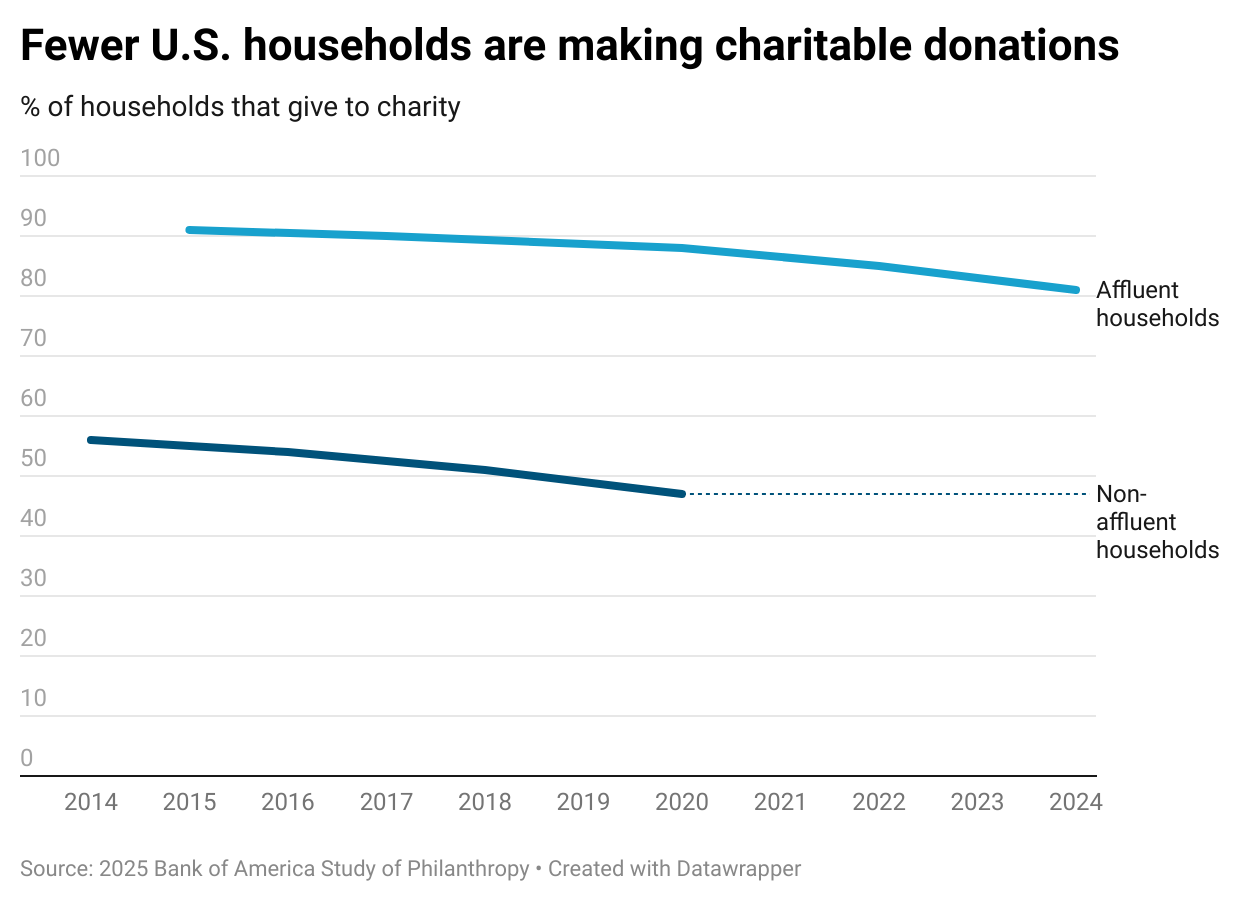How charitable giving is changing
Plus: N.C. town claims Duke Energy deception; Q&A on legal profession with new firm managing partner; Podcast on growth in the Carolinas; New city attorney; Excitable announcer praised
Good morning! Today is Monday, October 6, 2025. You’re reading The Charlotte Ledger, an e-newsletter with local business-y news and insights for Charlotte, N.C.
Need to subscribe — or upgrade your Ledger e-newsletter subscription? Details here.
Today’s Charlotte Ledger is sponsored by T.R. Lawing Realty:
Wealthy donors are giving more money overall — but fewer of them are opening their checkbooks, a new study says
by Tony Mecia
Fewer wealthy Americans are donating to charities. But those who give are giving more.
That’s one of the main conclusions from a new survey released last week by Bank of America. It found that total charitable contributions from affluent households have surged more than 30% since 2015 — but that the percentage of those households that gave to charities fell from 91% to 81% during that period.
The focus on the donation habits of wealthy households is important, because they represent an overwhelming share of the country’s charitable giving — as much as 10 times higher than non-wealthy households. The money supports such nonprofits as houses of worship, arts organizations and those that help provide social services and education, among other causes.
Some of those charities are under pressure nowadays, as pullbacks in federal funding and shifting priorities from foundations are making private philanthropy more critical.
The study suggests that nonprofits could better harness private giving by engaging donors as volunteers, educating them on different ways to give and appealing more directly to their interests and values, says Dianne Chipps Bailey, national philanthropic strategy executive with Bank of America in Charlotte.
“Fundraising is matchmaking, not sales,” she said.
The decline in the number of wealthy donors who give, the survey suggests, springs from an increased desire to prioritize helping their own families instead. But two other key reasons were that they didn’t feel a connection to an organization, and they were not asked to give.
“It’s so important for nonprofits to really expand their circle of prospective donors to build those relationships, communicating around the positive impact of the organization, and then not be shy about requesting those contributions and those investments in their mission,” Chipps Bailey said.
Other findings from the survey:
Volunteering is rebounding — and drives generosity: After dropping to 30% during the pandemic, volunteering among affluent Americans has climbed back to 43% in 2024, and volunteers give 2.5 times more than non-volunteers.
Donors are motivated by personal values: The top reason people choose where to give is alignment with their personal values, which 68% of wealthy donors identified as their reason for lending support. Having a recognizable nonprofit or working in an area of perceived need was less important.
Areas that receive the most support: The survey found that the top three categories of giving among affluent Americans are places of worship, basic needs organizations and higher education — a pattern that has remained consistent over time.
Most affluent donors lack philanthropic expertise — and that limits giving: Only 4% of affluent Americans consider themselves philanthropy experts, but those few give six times more than novices, suggesting that educating donors about giving strategies can boost generosity. The use of giving vehicles such as donor-advised funds or leaving donations in wills increased to 18% in 2024, up from 11% nine years earlier.
The survey was based on a nationally representative sample of 1,514 wealthy U.S. households. For the purposes of the study, a wealthy household was defined as one with a net worth of more than $1M (excluding primary residence) or household income of $200,000 or more.
➡️ Read more about the philanthropy study
Today’s supporting sponsor is Landon A. Dunn, attorney-at-law in Matthews:
Duke Energy is hauled to court by the town of Carrboro, which alleges climate deception; likens utility to Philip Morris
Charlotte-based Duke Energy is facing a novel lawsuit from the North Carolina town of Carrboro, which argued in court late last month that Duke should be liable for damages to the town’s roads and other property because of the company’s alleged deception over the link between fossil fuels and climate change.
Does that sound like a stretch? Not to Carrboro’s lawyers.
According to the publication Inside Climate News, which covered a Sept. 25 hearing in N.C. Business Court:
The case began in December 2024, when Carrboro sued Duke Energy, alleging the utility has funded and promoted a decades-long deception campaign to dismiss the connection between fossil fuels and climate change.
The long-term effects of the alleged deception reinforced the public’s reliance on coal and natural gas, town attorneys argue, which led to increased greenhouse gas emissions and accelerated climate change in the form of heat waves, greater precipitation, intensified storms and more flooding.
Carrboro has incurred millions of dollars in damages to 47 miles of roads and other town-owned property, allegedly because of more frequent and extreme weather that resulted from a warming planet.
“Each step—boom, boom, boom—is a natural sequence,” said Matthew Quinn, a private attorney representing Carrboro.
Quinn compared the case to litigation against tobacco companies: “Our theory is that Duke’s massive deception got everybody hooked on fossil fuels, like Philip Morris” and cigarettes, he told the court, the publication reported.
A lawyer for Duke Energy said the claims were “novel” and added: “There is no way to trace a statement by Duke to a pothole in Carrboro.”
The judge, who was considering the question of whether Carrboro’s claims should go in front of a jury, didn’t rule but instead asked lawyers to submit additional briefs later this month. —Tony Mecia
Q&A: Robinson Bradshaw’s new managing partner talks about Charlotte’s competitive legal landscape — and how the legal profession has changed
Last month, Charlotte law firm Robinson Bradshaw, the city’s third-largest firm, named Stephen Cox as its managing partner. In his new role, Cox will lead the firm’s 175 lawyers and 105 professional staff, who work in four offices in the Carolinas. Cox is a litigator who joined the firm in 1997.
The Ledger’s Tony Mecia talked with Cox about the Charlotte legal scene, the challenges of managing a firm and how the legal profession has changed over the years. Remarks were edited for brevity and clarity:
Q. It seems like the competition for legal work in Charlotte is getting tougher. How would you characterize that competitive atmosphere?
We all serve sophisticated clients who know their businesses. They know what they want. They’re sensitive to fees, and they’re sensitive to the work that’s done.
So we always know we have other competitors out there that have lawyers who are looking for the same client base we are, and we have focused on our core values — which is, we try to be extremely responsive by excellent legal service, and we do think that sets us apart, and we’ve been fortunate in maintaining good client relationships for a long time.
Q. Is managing a firm a completely different set of skills? Or is it sort of a natural outgrowth of the work that you have been doing in your career?
I’ll let you know! I am continuing to practice.
The common thread between the practice floor and the management of the firm is collaboration and teamwork. We are a firm that has always prized that in the way we practice law and in the way we handle our clients’ legal problems. And so really, when you manage a professional services firm like ours, it’s not a CEO, hierarchical leadership style, right? You try telling a bunch of lawyers what they have to do!
You advance by collaboration. Every day, I’m talking to my partners here about, what can we do to address this particular area? It’s all about walking the halls all the time, talking to people and working with people to achieve the right result.
Q. How has the legal profession changed since you started?
It’s become a lot more demanding in terms of responsiveness and attention.
Just the business world in general is much more demanding, much more sophisticated, much more complex. Our clients are calling on us to be much more responsive and attentive than they were 40 to 50 years ago.
If this particular lawsuit is heating up, or this particular transaction or deal is closing, our clients need to be at the ready all the time, and they rightfully expect us to be at the ready all the time.
General counsels of companies are much more sensitive to legal fees and rates, appropriately so, and so they’re asking questions all the time about our rates and our fees and whether those are appropriate. We have to justify the services we provide.
Q. When young people come to you and say, “Hey, I’m debating whether to go to law school,” what do you tell them?
If they’re just asking about law school, a law degree is a very versatile degree. You don’t have to come to a big private law firm with a law degree. You could go work in academia. You could go work in consulting. You can teach. You can go into private business.
I tell them, “Be prepared to read a lot, be prepared to write a lot, and write yourself — not using ChatGPT.” You need to be able to analyze and write yourself. But really, it’s about problem-solving.
So many people think from TV that it’s about fighting in court, or being adversarial, that sort of thing. Really, it’s about problem-solving. That’s what being a lawyer really is. And so if you enjoy working with people, solving people’s problems in whatever context, it’s a job you should consider.
🎧 New podcast: discussing the opportunities and challenges of the Carolinas’ growth, with an all-star panel
Charlotte and the Carolinas are booming — but growth brings both opportunities and challenges.
At the Canopy Realtor Association Expo in September, The Ledger’s Tony Mecia moderated a panel discussion on what’s fueling the region’s rise and how communities can keep up.
The panel featured:
Tracy Dodson of the Charlotte Regional Business Alliance
Dean Faile of the York County Regional Chamber of Commerce
Kit Cramer of the Asheville Area Chamber of Commerce
They explored why 157 people a day are moving to the Charlotte region, the need for housing and infrastructure to match the pace of growth, and strategies to address affordability, NIMBYism and workforce development.
From Charlotte’s booming job market and York County’s infrastructure investments to Asheville’s post-storm recovery and housing pressures, the discussion offered a wide-ranging look at how the Carolinas are managing rapid population growth while trying to maintain quality of life.
🎧 Listen to the full discussion on The Charlotte Ledger Podcast, available now on Apple Podcasts, Spotify or wherever you get your podcasts.
Many thanks to Canopy Realtors Association for making the audio available for the podcast.
(And also thanks to AC Creative Collective, who was The Ledger’s podcast sponsor for this episode!)
🍺 Join our team for a beer or two on Tuesday
Quick reminder: Ledger members are invited to join The Charotte Ledger’s team on Tuesday for our “Meet the Editors” happy hour!
We’ll buy a round or two. It’s one way we try to say thanks to Ledger members, whose support fuels our operation. It’s an informal get-together and a chance to chit-chat — and you can come meet our team, including our newest team member, managing editor Ashley Fahey.
Find the details here. Hope to see you there!
(If we miss you this time, we’ll catch you at another one soon.) —Tony Mecia
You might be interested in these Charlotte events
Events submitted by readers to The Ledger’s events board:
WEDNESDAY: “NAMIWalks Charlotte,” 10 a.m., Mint Museum-Randolph, 2730 Randolph Road, Charlotte. NAMIWalks Charlotte is our main fundraiser that supports all of our programming, including a resource library, support groups, peer-to-peer, caregiver, and family-to-family workshops, mental health education, and school presentations throughout Mecklenburg County. Free.
THURSDAY: “An Evening with the League: 2025 Transportation Sales Tax Referendum Forum,” 6:30-8:30 p.m., at Veterans Park Indoor Pavilion, 2136 Central Ave. The League of Women Voters of Charlotte Mecklenburg will host a public Evening with the League Community Conversation to help voters better understand the proposed one-cent transportation sales tax that will appear on the Mecklenburg County ballot on November 4, 2025. Susan Harden will moderate a conversation between a panel of local experts to provide voters with clear, factual information ahead of the referendum. Free.
FRIDAY: “Senior Scholars Weekly Meetings,” 10-11 a.m., at Providence United Methodist Church, 2810 Providence Road. These are difficult times for government agencies like the Government Accountability Office (GAO), whose job is to provide objective, reliable and nonpartisan information about the workings of our government. Hear more about what the GAO does to support the public interest from Davis Judson, Senior Analyst and project manager for the GAO’s financial markets and community investment team. $5 for guests. $25 annual membership.
SATURDAY: “Kids Night Out: Music and Art,” 5:30-8:30 p.m., at Arts+ Community Campus, 2304 The Plaza. Come bring your kids for a fun night in while you take a break with a night off! Children will enjoy a fun evening of play and creation as they sing, dance, and make beautiful artworks! Pizza will be provided. $50.
➡️ List your event on the Ledger events board.
In brief:
New city attorney: The Charlotte City Council unanimously hired Guilford County attorney Andrea Leslie-Fite as its new city attorney, with her start date set for Nov. 3. Interim attorney Anthony Fox will receive an additional $56,000 from taxpayers for working just a few extra days until she begins. (WSOC)
Key transit tax endorsement: The Black Political Caucus has endorsed next month’s proposed Mecklenburg County sales tax increase, which would fund a $25B transportation plan that includes new rail lines, expanded bus service and road improvements. (WFAE)
High school football ticket changes: Charlotte-Mecklenburg Schools plans to cap ticket sales for high-profile high school football games — no gate sales, fewer presales and more tickets reserved for the home team — to improve safety. (WSOC)
Interstate construction: A $45M project to ease congestion at the I-85/I-485 interchange near Charlotte’s airport begins today, bringing weeks of overnight lane closures as crews widen bridges, shift lanes and build new ramps to improve traffic flow and safety. (Observer)
Online driver’s license renewals: Gov. Josh Stein signed a bipartisan bill allowing North Carolina drivers to renew their licenses remotely for a second consecutive time, while also removing the driver’s log requirement for teens seeking a full provisional license. (WSOC)
Taylor-made notifications: A Durham entrepreneur created a popular app called Swift Alert, which provides users with updates on Taylor Swift’s concerts and life, plus daily games. It has more than 2.5 million downloads. (Axios Raleigh)
Loves me some internet: The world discovers excitable Charlotte Hornets announcer Eric Collins; ‘breakout star,’ ‘instant hit’
High-energy Hornets play-by-play announcer Eric Collins called his first NFL game on Sunday — the Carolina Panthers game vs. the visiting Miami Dolphins — and the internet went wild.
From the Sports Illustrated article “Eric Collins Praised by NFL World for Very Awesome Call of Panthers-Dolphins Game”:
In his NFL broadcasting debut, Collins made an already exciting game between the Panthers and Dolphins even more thrilling with his loud, out-of-his-seat hoots and cheering of even the most standard, run-of-the-mill football plays. Collins, who has long endeared himself to sports fans in Carolina as the Hornets’ easily excitable commentator, worked with the much more stoic Mark Schlereth in the Fox Sports booth on Sunday, and his animated passion was on full display.
It also called him “the real breakout star of the game” who was an “instant hit.”
Here are a few clips of his calls from Sunday:
 Tiktok failed to load.
Tiktok failed to load.Enable 3rd party cookies or use another browser
Need to sign up for this e-newsletter? We offer a free version, as well as paid memberships for full access to all 6 of our local newsletters:
The Charlotte Ledger is a locally owned media company that delivers smart and essential news. We strive for fairness and accuracy and will correct all known errors. The content reflects the independent editorial judgment of The Charlotte Ledger. Any advertising, paid marketing or sponsored content will be clearly labeled.
◼️ About The Ledger • Our Team • Website
◼️ Newsletters • Podcast • Newcomer Guide • A Better You email series
◼️ Subscribe • Sponsor • Events Board • Merch Store • Manage Your Account
◼️ Follow us on Facebook, Instagram, X/Twitter, LinkedIn






Please, ask Duke to turn off the power to Carrboro—the center of communism in Eastern North Carolina! If they are so stupid, let them freeze this winter.